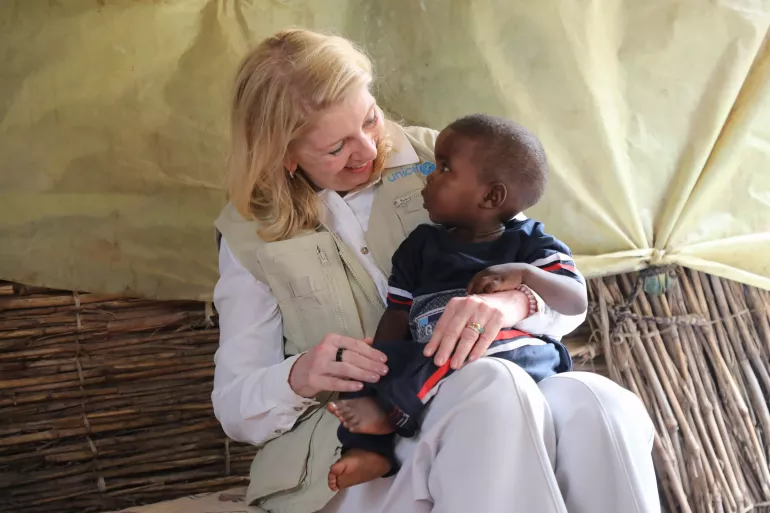UNICEF Executive Director Catherine Russell on Monday concluded a three-day mission to Chad, warning of the worsening crisis affecting children in the eastern part of the country that has seen the arrival of hundreds of thousands of refugees from Sudan.
According to a UNICEF press release, Russell met with children living in host communities and child refugees as the number of children displaced by the Sudan conflict has now exceeded two million – a staggering figure that includes over 700,000 children who have crossed into eastern Chad since violence erupted in April 2023.
“Hundreds of thousands of the most vulnerable children are bearing the brunt of both the war in Sudan and a lack of essential services for those who have fled to Chad,” said Russell. “In eastern Chad, I met women and children who arrived with little but the horrific memories they carry. One woman shared a painful account of fleeing El Geneina in Darfur because of killings, mass rapes, and homes being burned. Hundreds of people continue to arrive every day. Many children are malnourished, out of school, and at serious risk of exploitation and disease. Host communities are sharing what little they have. But all of these children need urgent support and protection.”
During her visit to Adré, a border town overwhelmed by the arrival of hundreds of thousands of refugees, Russell met with newly arrived families, a Chadian foster family caring for an unaccompanied child, and visited a centre where women and girls receive gender-based violence services. With one resident for every six refugees, host communities in Adré are stretched beyond capacity.
“Since the onset of the conflict, nearly 860,000 Sudanese refugees and around 274,000 Chadian returnees have sought refuge in Chad, according to government figures. Children make up 61 per cent of refugee arrivals and 68 per cent of returnees – totalling over 700,000,” the statement said. “The vast majority have entered through Adré and other entry points in the provinces of Ouaddaï, Sila, Wadi Fira, and Ennedi Est – areas already among the most deprived in the country.”
UNICEF states that, despite the Government of Chad’s and humanitarian partners’ immense efforts, the scale of the crisis remains overwhelming. Measles and malnutrition are spreading. The risk that a cholera outbreak currently affecting areas of West Darfur could spread to Chad is high. Two out of three refugee children are not enrolled in school. The strain on water, health, and protection services is acute.
Chad is already one of the world’s poorest countries. Despite cutting under-five mortality by half since 1992 to 101 deaths per 1,000 live births today, and increasing routine childhood vaccine coverage, it still has the fourth-highest child mortality rate in the world. Some 1.5 million children under five are stunted, and over three million children are out of school.
Crisis upon crisis continues to take a toll on children driven by conflict, violence, and the impacts of climate change. “The people of Chad have shown extraordinary generosity,” Russell said. “But they cannot do this alone. We must stand in solidarity with them – and with the children of Sudan – by expanding support to national systems and communities on the front lines – for all children.”
UNICEF is delivering an integrated emergency response, focusing on child protection, health, nutrition, water and sanitation, and education. In Adré and surrounding areas, UNICEF-supported teams have vaccinated thousands of children, provided safe water to tens of thousands, and established child-friendly spaces and gender based violence services. However, critical funding gaps remain. UNICEF requires $114 million for its 2025 humanitarian response in Chad, including eastern Chad. The overall response is currently 34 per cent funded.
Russell also met with President Mahamat Idriss Déby Itno to reaffirm UNICEF’s long-term commitment to Chad and to discuss support for the country’s newly launched National Development Plan 2030. UNICEF is working closely with the Government to scale up system-wide investments in health, including polio vaccination campaigns, education, and social protection.




